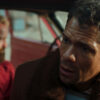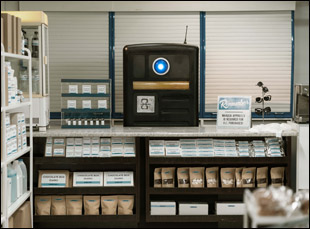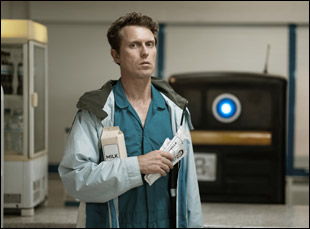When Matt Vesely received word that his short “System Error” was accepted to the Tribeca Film Festival, he learned that it was already a huge hit at the office, its lead character George irresistible enough to begin quoting him around the office and imitating his laugh. After worrying George might not be more than the sum of its parts, the writer/director was relieved he made such a personal connection.
“He’s just a flashing box, right?” Vesely said of the robot star of “System Error.” “It is just the best compliment I’ve ever received. I thought the fact that people are relating to him is so beautiful.”
As it turns out, there’s a lot going inside the mainframe of “System Error,” Vesely’s follow-up to “My Best Friend is Stuck on the Ceiling,” which just made its debut on Short of the Week, and after checks in on an awkward meeting between longtime friends where one yearns for something more, the comedian and filmmaker observes the start of a relationship 54 years after aliens have overtaken the earth, installing robots to serve the remaining humans not unlike the self-checkout systems that have crept their way into our daily lives now. Although there’s plenty to be afraid of in this new universe, it’s the most primitive of concerns that takes center stage as George (voiced by Nick Nemeroff), a cashier at a local convenience store, grows sentient and hopes to add small talk into its abilities to make customers feel more comfortable. Trouble arrives in the form of Sid (David Quirk), who introduces George to the notion of jokes while attempting to pay for some ice cream sandwiches.
While watching George work out his material as rigorously as any stand-up would with literally not enough humanity to understand what makes things funny is amusing enough, Vesely finds something truly poignant in George’s evolution, as the robot attempts to overcome its own internal programming to forge a genuine friendship with Sid. Delivering an emotional wallop when George can finally figure out a proper punchline, “System Error” was set to be the introduction to an entire world that Vesely plans to explore in a new series and while this world will have to wait just a little bit longer to wade into it thanks to the coronavirus, Vesely spoke about the surprisingly prescient charmer that’s well worth looking forward to, creating a low-key dystopia and how casting fellow stand-ups has enlivened his work.
I’ve been working on these characters for a while. It was a feature film script I was developing a few years ago and it came out of a group here [in Australia] called Closer Productions. We were kicking around ideas that weren’t part of the company and I love science fiction, so I was just coming up with this world and just pulling ideas out of nowhere. I landed on this dystopian alternate world full of these crappy robots. I was a big “Futurama” fan when I was a kid and watched it on repeat for years, so I’m sure that’s part of the inspiration, and we [started] developing it into a digital series, so we got some funding to make a proof of concept for that bigger project, and we used that as a kind of way to work with George and get him up and running.
You’ve said Nick Nemeroff was in mind from the start to voice the robot. Did that influence the design of George?
Just before I started writing the various versions of the world that became this film, I’d worked with Nick. He’s a standup from Canada and he’s based in L.A. and he did a lot of standup in Adelaide where I’m from. He was a friend of mine – I do standup as well and I had gigs with him and I said, “Hey, just come and be this waiter character in the background” and we did this short “My Best Friend is Stuck on the Ceiling,” which is like a romcom set in a cafe. He was just going to be the waiter and he had two or three lines, but we let him improvise, and everything he improvised ended up in the film. He’s just a very funny guy and he’s got an almost robotic performance style. He’s very measured and he seems quite unemotional, which I just found that hilarious, so I was writing that character [of George] with the idea of I’d love to write something with Nick at the front of it. We just recorded [his dialogue] on Skype because obviously when you’re a low-budget film, we can’t fly him over, so I sent him the dialogue and he had a podcast mic set up to record all the dialogue and sending it back.
How did David come into the mix?
He is also a standup. Having done comedy for a few years, I really like working with comedians as actors. They really make interesting choices that other actors maybe wouldn’t make, and David was just a standup I’d admired for a while. He’d done a bunch of TV in Australia as well — “Please Like Me” and “Rosehaven,” which are both great comedy shows, and we had a lot of common friends. He knows Nick from doing standup as well, and we sent him a script and he jumped on. He’s based in Melbourne and he flew over for a few days and shot it.
Did he actually have dialogue to work off of on the set?
Yeah, George the prop was made by Stephen Robb, who makes cosplay stuff here in Adelaide and he built this out of foam and laser cut wood and 3D-printed pieces. The light bar is actually triggered by audio, so it has a sound wave analyzer in it, so I sat behind the monitor with my laptop with all the dialogue queued up and basically performed George on set, hitting the dialogue cues and it’s playing out through speakers, but also playing through George and triggering that flashing light, so it’s all practical, all on set.
I did a live standup show with George as well, [where] we did the same thing. We had him on stage and he just talks, but also you can hear it, so David does have the voice there [to act off of]. He did an amazing job committing to acting opposite a flashing box and in an ideal scenario, you’d have Nick on set talking so they can improvise with each other, but the dialogue is pretty fixed, so that was a challenge for everyone, but Dave rose to the challenge. He’s a great performer.
Finding a shop to film in is surprisingly difficult. Obviously, if you’ve got money, you can pay a shop to shut down for a few days and go shoot in it, but we didn’t have that much, so there was an old Indian supermarket that had been closed for six months, but they hadn’t managed to renovate it or get new tenants in, so it was just available. We managed to go in there for a few days, but it was very dirty, which was perfect because of the aesthetic and the whole bigger story [idea] which we’ve got for the series that maybe alien overlords were there at some point and had this glistening, more “Blade Runner”-esque dystopia, but it’s gradually fallen to pieces.
Our production designer Lauren Murray did a sterling job working with very little time creating all those products in the store [that’s indicative of] this homogeneous, boring life with all the safety signs on all the walls and the humans all wearing these jumpsuits that [reflect] this very docile, very safe life, so connection becomes the only thing that can shake you out of that. That’s why it was really important to build a shop that doesn’t look like our world. It looks like that kind of rundown dystopia is playing out within a convenience store and the kind of lived-in science fiction is something I really liked.
I wouldn’t want to spoil the end of the film, but it ends on a lovely, bittersweet note. Is that what you’re aiming for with the larger series you’re thinking of?
Certainly the big theme that’s present in the bigger series and the short is about mental health. George is convinced that he’s broken and he’s terrified that he’s broken and he’s constantly looking inward, trying to fix himself. A broader dystopian world that’s obsessed with safety and fitting these rules [serves] as a metaphor for anxiety – these invisible threats you place on yourself and how oppressive that can be. That fear can be more dangerous than anything you’re actually worried about, so certainly the melancholy is very important and [what’s interesting is] the very ending of the film is different than what it is in the script. Dave’s performance is quite different. [He and George] were going to have this joyous moment, but Dave said, “I’m not feeling this. I don’t know and I think there’s another way to do this,” and I’m like, “Of course, go for it. Let’s try it.” And immediately it gives you that ambiguous moment of are they going to be okay? Maybe they won’t be okay. But that’s the truth of life. Maybe they won’t be alright, but maybe not being alright is okay as well and maybe not knowing is okay as well.
It’s always good in a short to leave a bit of ambiguity anyway, and the ambiguity and the melancholy of that in my own experience of mental health issues is that it’s something you live with, it’s not something you fix or it’s not an era you can erase or reboot your firmware. It’s something that makes you who you are and it’s actually a really great part of who you are, but it’s something you’ve got to learn to live with. It’s always going to be there and embrace that, you’re going to be a lot better off.
As we’re sitting here in quarantine, has the film taken on new meaning for you as we’re relating with each other so much through technology?
It’s a film about the isolation we put on ourselves, I think. George is stuck inside that shop. He can’t leave, but he does have people come and visit him everyday, so he tries to reach out and find a way to break that isolation, and sometimes we isolate ourselves even when isolation’s not happening. That isolation can be dangerous and connection with other people is fundamentally important to your mental health, so with all this going on, I think it’s become timely film, but [as far as] the technology, I’m not so sure. George, to me, has always been a very alive character — I don’t think of him as a robot, but certainly the idea of connection and the fact that I haven’t seen my friends in six weeks and I’ve spoken only to my family via Skype like I’m talking to you, that’s a very strange thing that can work for a while, but eventually we’re all going to need that connection just like George does.
“System Error” is awaiting its festival premiere.






